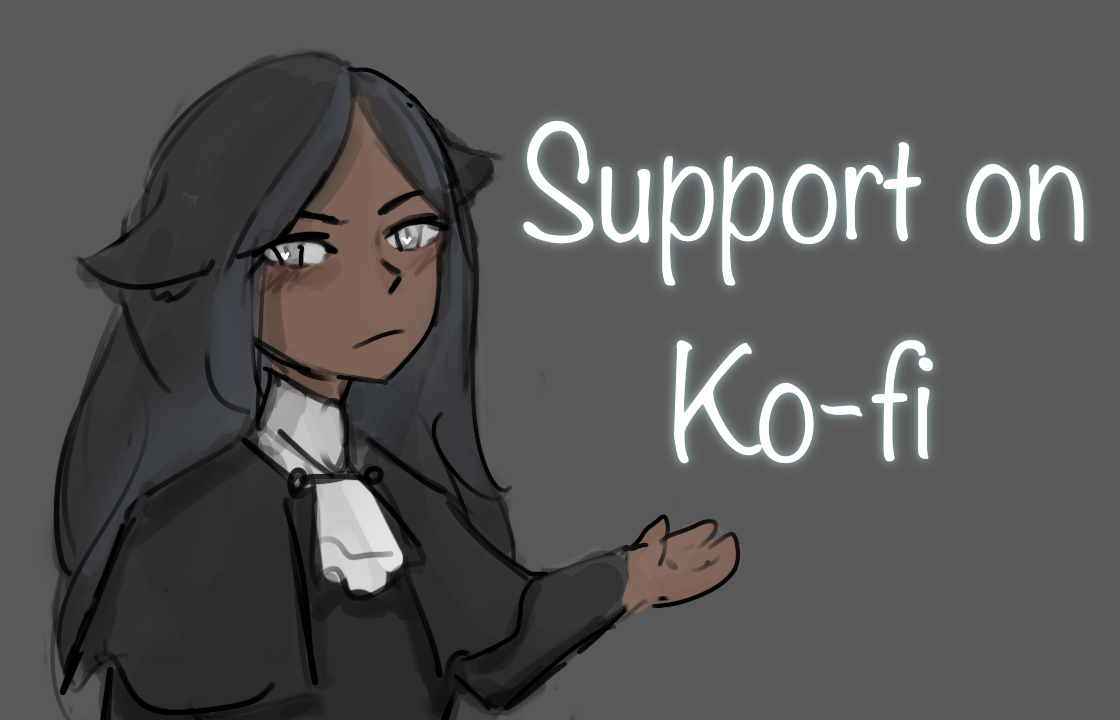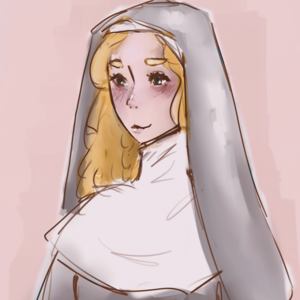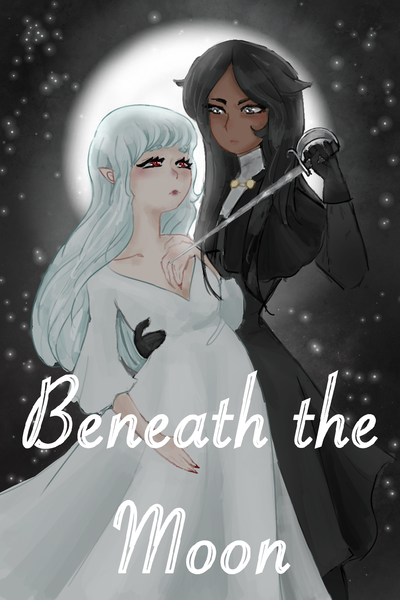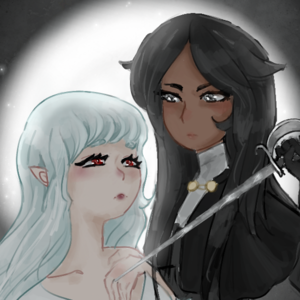Rosemary’s body woke her at midday and did not let her return to her sleep. She lay there for at least an hour in the darkness of her coffin like a chick in its egg, then rose to the afternoon sun streaming into her room through the lacy curtains. It stung her skin when she pressed her hand up to the frosted glass, and she kept it there anyway, until her heart beat as though it were alive.
Then she pulled away and stared at herself in the mirror. She had a reflection, but found, as it had been for centuries, that she could not perceive it. The being that sat where she sat, wearing what she presumed was her face, was as alien to her as every servant in the castle.
A thousand years of life had also diminished her opinion of her looks. She remembered, once, thinking herself pretty. Yet for centuries now she had seen nothing but the same faces over and over again, the almost unchanging staff blending together until it seemed that they had one face, all reflections of the same person, over and over and over and over and over.
She knew none of them. They did not know her.
Then there was Agnes, with her sharp features and dark hair and dark skin.
Blinking, she wondered what Agnes might think of her looks.
Rosemary looked to her left. Between her coffin and her dressing table was a small rope; she rang it once and heard the chime of Agnes’ bell in the other room. It would be clanging all about the castle, too. A complicated system of ropes had been set up, so that no matter where her maid was, she would know she was wanted.
It did not take long for a small knock on the door.
“Come in,” Rosemary said. And the door opened. There was Agnes, looking sharp in her uniform, holding a wooden tray, upon which sat a teacup.
“Aster said you’d enjoy a cup of blood at this time.”
Rosemary nodded. “Indeed I would. Any notes on who it’s come from?”
“Oh!” Agnes shut her eyes a moment. “Aster said it was a special blend.”
“Bring it here,” Rosemary ordered, lifting a hand.
Agnes came to her obediently. “Of course, Rosemary. Might I ask why you’ve summoned me?”
Rosemary took the cup and saucer in her hands and brought them to her lips. She tasted a gentle tang, but could not place the types. “I had thought you might decide my clothing for the night.”
Agnes blinked. “You’re leaving... fashion to me?”
“Aster said that you had mentioned apprenticing with a clothier in your letter,” Rosemary reminded her. “I thought you must know something about clothes. I’m afraid I’ve worn this nightgown for a hundred years or so.”
“And have you bathed in that time?” Agnes asked.
Rosemary remembered the crash of cold water on her skin and closed her eyes. “I have. The nightgown is washed, as well. I may be of an older time, but we were never barbaric.”
“I see,” Agnes said. “That was my mistake. What sort of garment are you in the mood for?” She turned to the case. Rosemary sipped her cup of blood and watched Agnes through the mirror. “Ah, it’s all moth-eaten!”
Rosemary sighed. “I promise there is more in there. Those are my old things, and my favorites. I cannot wear them, but I like to look at them sometimes.”
There was a pause. She watched Agnes rummage around, producing a dark shape from the back of the wardrobe.
“Black?” Rosemary murmured. She had not worn the color in centuries. It was too expensive, she had thought. Too indicative of her noble class.
“It’s a sharp color,” Agnes said, “and you know, it is fashionable in Cordis.”
“I suppose you would know,” Rosemary conceded.
Agnes turned, holding the garment. “Here you are then.”
Rosemary sipped her blood. “Won’t you help me put it on?”
“Oh?”
“You are my maid, aren’t you? So help me dress.”
Agnes blinked slowly, like a cat, then placed the garments on the coffin. “Come then,” she said, cheeks a little pink. “Let’s get you undressed.”
Rosemary stood beside her and began to peel off her nightgown. In the mirror, she saw that Agnes was looking careful around the room, rather than at the woman before her.
“See anything interesting?” Rosemary asked.
Agnes nodded. “Your room is... smaller, than I expected. But still well decorated. I didn’t realize you would sleep in a coffin.”
“A coffin does not allow in stray bands of light.”
“And yet,” Agnes observed, “your room has windows. I thought vampires feared light.”
“It is a little more complicated than that,” Rosemary said, stepping out of her dress. “Light is important.”
“Important, how?”
Ah, but it was nice to hear her ask. Nobody had asked Rosemary such things in centuries. “It’s the source of life.”
“Why do you value it?” Agnes asked, helping her slip on a pair of stockings. Her gaze was focused still on the window with its lace curtains. Bright red was blooming across her dark skin. “Aren’t you a creature of the dead?”
Rosemary smiled. “One that is reliant on the life of others to exist.” She, too, watched the light in the windows, as Agnes helped her into a pair of slippers, then drawers, and a layer of an underskirt and chemise. The warmth of her hands, brushing against Rosemary’s cold skin, felt strange to her. As though she were stone being etched. She did not know why. “Modern clothing is dramatic,” she hummed. “I miss the garments of my youth. A simple chemise, a kirtle, and a belt. That was all a girl needed to go about the day.”
“You’ve forgotten shoes.”
“I haven’t worn shoes in centuries,” Rosemary said, wiggling her toes. The slippers that Agnes had stuck her in restricted their movement. How curious!
“This clothing is already a little old, but who has the money for anything new? You’d fit right in on the streets of Cordis.” Agnes hummed. “Or, you will, once I finish dressing you.”
For a moment, they stood in a pleasant quiet. Rosemary listened to the rustling noise of cloth as Agnes began to pull her into a corset. She had never liked the things before; when the maids had tried to dress her in them, noting how they were the next fashionable thing, and far better to wear than stays. But Rosemary had pulled away. She had made so many changes already for the sake of modernization. This, she had determined, was too far.
Now Agnes deftly laced the garment up. It was not nearly so tight as Rosemary had expected, pressing around her like a gentle hug. She found that she rather liked the feeling.
“I’ve never worn a corset before,” Rosemary gasped. “I thought it would be restrictive.”
“If you laced it too tight it would be,” Agnes said, “but my old job required I be ready to move. We practice safe binding. In a pinch, it’s even a little protection from claws and teeth.”
Rosemary blinked. “That doesn’t sound like something a seamstress does.”
Agnes’ hands stilled. Rosemary missed their presence. “Something I learned on the streets of Cordis, is all. From when I was turned...”
“Ah,” Rosemary glanced down at her hands, then at herself in the mirror. Agnes, having laced her into the garment, pulled a crinoline from the wardrobe. “I did not mean to revive bad memories.”
“That’s alright,” Agnes said, but her jaw was clenched. “They come on their own. You learn to put them aside. Better to think of other things. Better to be useful.”
Finally, finally, Agnes took the black bodice and skirt from where they sat, and draped them overtop of Rosemary with a flourish.
She stared at herself in a mirror; the usual, imperceptible shape that was her body was now a dark inkblot.
“What do you think?” Agnes asked.
Rosemary blinked. “You did well.”
One of her sharp eyebrows rose. “That isn’t an answer. What do you think of your outfit. I worked very hard on it, and dressing you was very difficult.”
“Oh, I’m sorry,” Rosemary said. “I did not mean to make your life worse.”
“Well. Make it up to me by answering my question. How do you look?”
Rosemary looked at herself in the mirror and could not see a thing. “Describe me,” she said. “It seems we vampires have no reflections.” Her voice had an odd warble to it. Why?
“But you have one,” Agnes said, standing behind her. Her silver eyes were sharp in the mirror. “It looks like that is another myth debunked.”
“Well, I cannot see it,” Rosemary bit. “I cannot see it, so you must tell me.”
Agnes blinked. Her hands came to rest upon Rosemary’s shoulders, warm and steady. “I’ll do my best, but I am no poet.”
“I am not asking for a poet,” sniffed Rosemary.
Agnes nodded. “Your face is sweet, and your hair is pale. You would think the darkness of your dress would eat you alive, but instead there is beauty in the contrast. In the same way your bright red eyes glisten when all other color is washed away. You are small. You look like a blooming rose. You look alive.” Her voice was deep and gentle, with a husk that brought winter mornings to mind.
Rosemary blinked. For a moment, she could see it. Her face in the mirror, pale as paper. The darkness of ink; Agnes’ words written across her body through the cloth. Her eyes, a usually hated red, glittering among it all like blood from a beating heart.
“Oh,” Rosemary breathed, and then her reflection returned to nothing.
“There. Now, did I do a good job?”
Rosemary turned to face Agnes. Her eyes were even more beautiful this close. “You did wonderfully. I have never looked so lovely.”
Agnes preened. “I can do a good job.”
“Yes you can! Why, you must do me everyday!” Rosemary exclaimed.
Agnes coughed and glanced back to the window. “I can certainly dress you. I will look and see what clothing you have, to better plan your outfits. What about jewelry?”
“I have centuries of it, but no silver,” Rosemary said. “Though, I suppose that you wouldn’t wear it either.”
“Oh?”
“Because it burns. How sad, that we cannot touch one of the moon’s gifts.”
Agnes raised an eyebrow. “Of course. It is very sad.”
Rosemary smiled. “You get used to it, in time. There is so much about this life that mortals miss, just as well miss parts of theirs.”
Agnes nodded. “Of course.” She glanced at the window. “Oh, it’s sunset. Rosemary, might I have permission to eat dinner?”
“Yes,” Rosemary agreed. “Have lots. Tell the kitchens to give you seconds. A reward for a job well done.”
Agnes smiled. “Thank you, Rosemary.”
As she left in a swirl of skirts, Rosemary caught something gleaming on her wrist. In the sunset, the color of the light was warm, but she could have sworn that the metal was as silver as the moon.












Comments (4)
See all